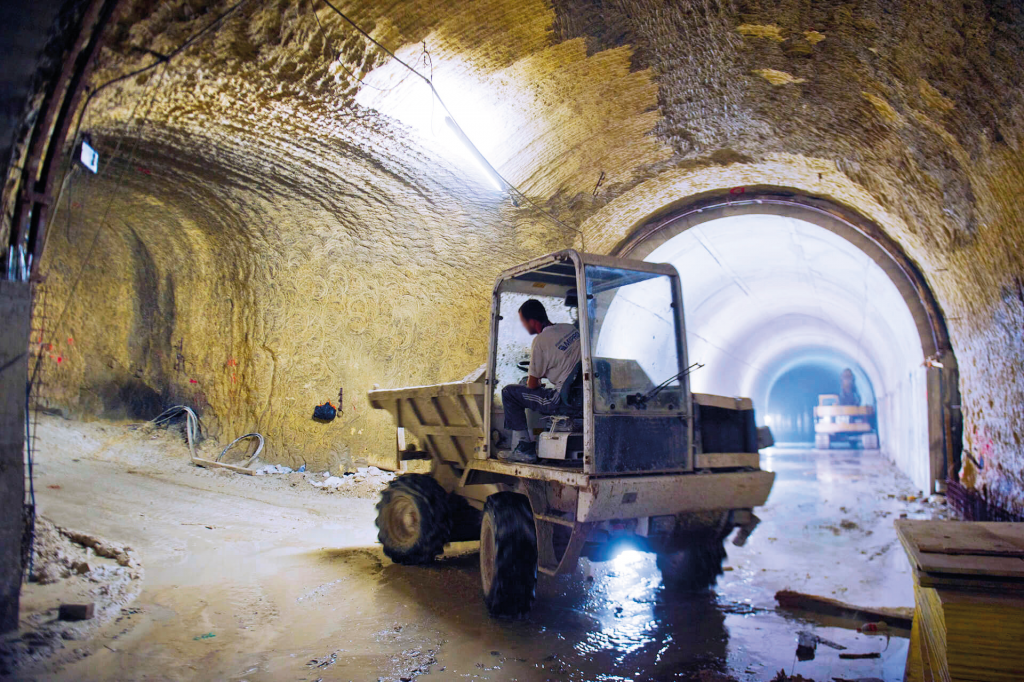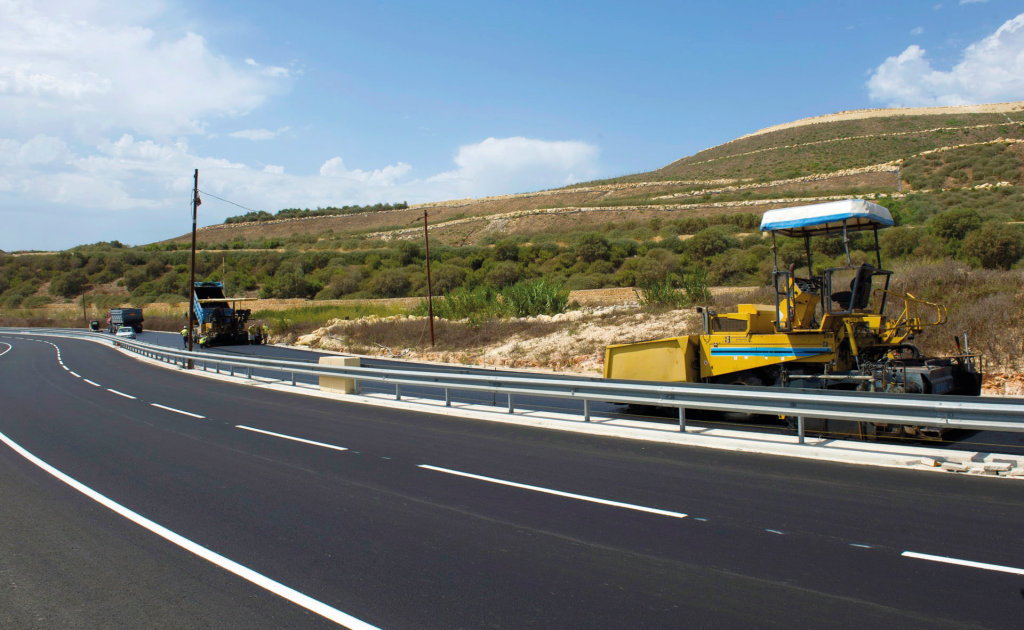Bonnici Brothers Ltd has been a leading player in the civil engineering and road building industry since 1975. It has built a formidable reputation for sustained development in its people, latest technologies and its manufacturing plants.
One of their ongoing projects – a 9.5 kilometre, three-metre wide tunnel to carry water from the Pembroke reverse osmosis plant to the Ta’ Qali reservoirs is a result an investment of €2.1 million in specialised machinery as their Project Manager Steeve Pendel explains to Design & Build.
Bonnici Group has been in existence since 1975, when the Bonnici siblings – John, Benjamn, Emmanuel and Mario founded the company. Since then it has provided its vast range of services to private, commercial, industrial and national construction sectors. Its portfolio of high profile projects continues to grow exponentially as it constantly invests into an ambitious and effective expansion strategy.
One may speculate that no other company in Malta is capable of offering its clients a multitude of benefits, but whilst there are other companies who have the capability of working on similar projects, Bonnici Brothers have proven to be the most competitive, without compromising on quality. Such a bold statement is supported by the fact that the company has its own qualified team of engineers, project manager, skilled labourers and mechanics that are available on a round the clock basis.
The Company’s ethos of providing quality products and services at exceptional prices is buoyed by their reputation that has been rightfully gained over decades.
PEMBROKE – TA’QALI TUNNEL PROJECT
The Pembroke – Ta’Qali project is not a first for Bonnici Brothers. In 2012, through a joint venture with an Italian company, they undertook works on the National Flood Relief Project, which was part of the Government’s plan to solve flooding problems during the rainy season. The project consisted of the construction of various underground tunnels and shafts to allow rain water to flow through them instead of passing into our public roads. Partly funded by the EU, Bonnici Brothers heftily invested in special equipment to be able to complete this project which saw the construction of tunnels having a diameter of around 8 metres and a length of 10 km.

The Pembroke – Ta’ Qali Tunnel Project, which forms part of the Water Services Corporation’s ‘Net Zero Impact Utility’ project, consists of the formation of an underground tunnel from the reverse osmosis plant in Pembroke to the reservoirs in Ta’ Qali. Excavation involves 4 locations – Pembroke, Ta’ l-Ibraġġ, l-Iklin and Ta’ Qali.
Once completed, the tunnel will distribute pure water through fibreglass pipes from the reverse osmosis to the reservoirs, where it will be blended with groundwater, eliminating the need for the water to be dosed with lime. It will then be sampled and treated, to ensure an optimal quality blend. Thus, all the blending potential of RO water is exploited and pumping energy reduced to the barest minimum, therefore granting better efficiency and optimal environmental performance.
An interesting part of this project is that in the tunnel there will be another pipe that delivers good quality mixed water to the centre of Malta with a new gravity system, without any need for pumps.
Bonnici Brothers carried out their own tests to ensure that the work they would undertake would be well within international certification parameters
Despite a number of tests being carried out prior to the publication of the tender to establish the requirements that needed to be met, upon being awarded the tender, Bonnici Brothers carried out their own tests to ensure that the work they would undertake would be of the expected level and well within international certification parameters.

Equipment integral to this project is the roadheader; a complex excavating machinery consisting predominantly of a boom-mounted cutting head, a loading device usually involving a conveyor, and a crawler travelling track to move the entire machine forward into the rock face. Although they are quite particular pieces of equipment, Bonnici Brothers has the support of Unec Ltd – part of the Bonnici Group – which has the capability of supplying required spare parts directly from stock.
The operational process involved in projects of this nature would consist initially of the drilling part which constitutes around 70% of the overall job. Throughout this process, Bonnici Brothers were operating in full capacity -meaning that five machine crews are on site working day and night on a three-shift basis. The course of the project sees the rock being scrubbed and the removed material is then carted away into a quarry for its proper disposal.
Throughout this process, Bonnici Brothers were operating in full capacity -meaning that five machine crews are on site working day and night
The next stage was the civil works part. Considered to be the most important part of the process, the major undertaking in this part of the project was the shotcreting process. This involves the spraying of concrete or mortar conveyed through a hose and pneumatically projected at high velocity onto a surface. This is a critical part of the whole course of the project. It not only ensures the stability of the tunnel but has to be completely airtight.

Bonnici Brothers prides itself in having an infrastructure that is well equipped to adhere to ambitious timelines
In situ testing takes place – one has to understand that this is a difficult process since the 10cm thickness makes it difficult to spread the mixture in one go. The process also includes a series of formulae with additives to arrive to the best mix. Ultimately it also has to give a good overall finish to the works.
ON REACHING DEADLINES
Bonnici Brothers prides itself in having an infrastructure that is well equipped to adhere to ambitious timelines. However, in the true nature of the business environment it operates in, there are times when a project requires more work than initially expected.
There is no secret solution to this apart from regular communication between the company and their clients. Communication is ongoing from the very start of the project – in instances when circumstances cause initial targets to be hard to achieve, then this exercise is ramped up even further.
With a team of seven to eight project managers, two surveyors, a quantity surveyor and three architects, Bonnici Brothers is not short of resources to provide meaningful communication – and the guarantee that the company can allocate all required available resources in an attempt to meet the deadlines, despite some changes to initial plans.

ON A COMPETENT WORKFORCE
It is no secret that Malta is suffering from a lack of skilled labourers in the field. Yet, this does not discourage Bonnici Brothers who take it upon themselves to provide ongoing training.
job shadowing is in place to ensure that any less experienced labourers are teamed up with the more experienced ones
A hands on approach is an example set by one of the directors who has no qualms about literally rolling up his sleeves to ensure that a project goes accordingly to plan. His involvement is the best possible means of knowledge transfer to ensure that the workforce are not just qualified but also full competent to perform the job they are given. A concept of job shadowing is in place to ensure that any less experienced labourers are teamed up with the more experienced ones.
FROM HUMBLE BEGINNINGS TO BEING A KEY PLAYER
Bonnici Brothers have come a long way since their humble beginnings in 1975 when they set up the company, purchasing their initial equipment and employing their first three employees.
Four decades and one hundred forty employees later, the company has grown to encompass a group of three main companies – Bonnici Brothers Ltd, Żrar Ltd and United Equipment Co. (UNEC) Ltd. – each key players in their own right.
What was the brainchild of four entrepreneurial brothers, has now become a leading figure in the construction industry and has some of Malta’s major and most complex projects to its name. Nowadays, mention the name Bonnici Brothers, and diverse projects the likes of the Coast Road, Malta International Airport, Manuel Dimech Bridge, Ta’Kandja Shooting Range and Ta’ Qali Crafts Village to mention a few; come to mind.
The expansion of their services portfolio, a result of careful and strategic investment, has proven that theirs has been the perfect example of a huge success story.

Comment